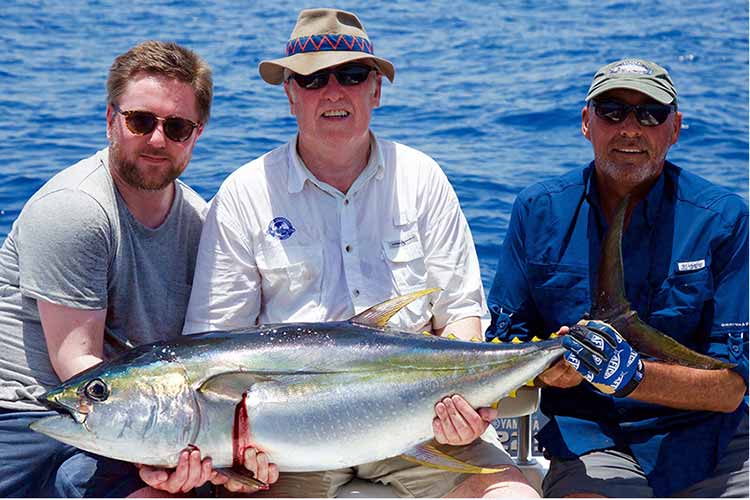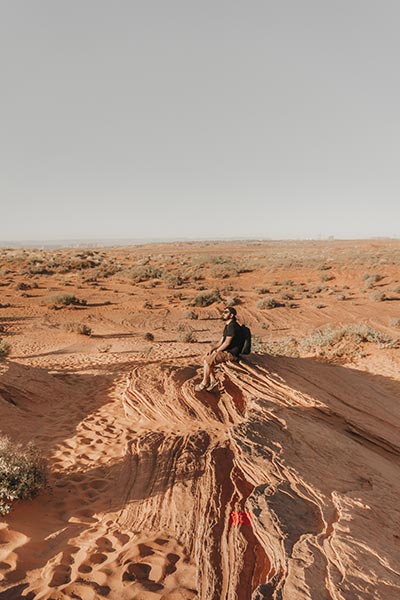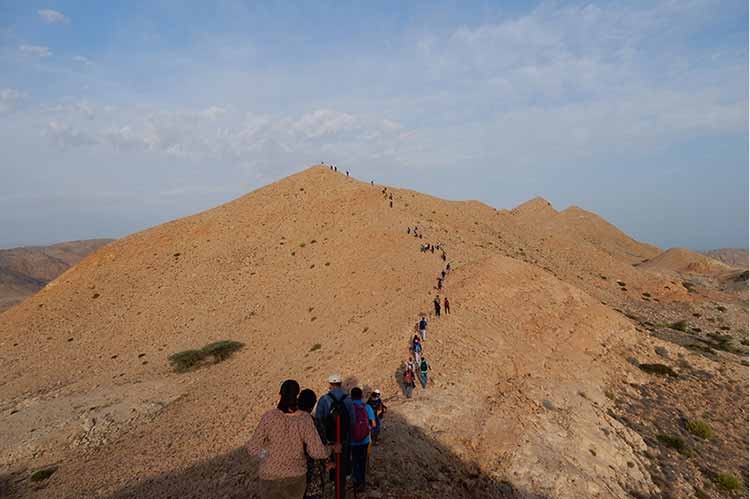Game Fishing
Winter is a great equaliser. It has its own ways of making things pleasant for all outdoor activities, including fishing, in this part of the world. Although there is no ideal season for game fishing, as Adrian Hollis notes, some times of the year are better for fishing than others.
A renowned game-fisherman and GCC based investment professional, Adrian, who likes to spend his weekends chasing fish in Oman, has found that there are more fish caught by game-fishermen during the winter than at other times. This, as he observes, may be due to the fact that it is simply more pleasant to be out when it is cooler.
Explaining about game fishing in Oman, he says: “The game fish we have here in the Sultanate are mainly migratory, which are affected by the seasons and water temperatures. When the weather (and therefore water) is hotter, there will, most likely, be more Dorado around. These are a mainstay for the boat-born game fisherman.

“Sailfish are another traveller through Omani waters; they also like the warmer weather. Should a game fisherman manage to catch one of these magnificent creatures, he will surely have had a day to remember.
“In addition to the above there are a number of Tuna species that can be caught here throughout the year. Yellow-fin Tuna is, of course, the one we are most likely to catch. They can grow to an enormous size and will test the tackle and boat handling skills of anyone who is lucky enough to hook into one.
“These fish dive deep when hooked, so make sure you have enough strong line. If you are lucky enough to catch a big one, you will be in for a long battle to get it on the boat. Over the years, I have been privileged to watch many local fishermen catch these on what is the most basic equipment. And they do it well.
“Word of warning… Unless you are very lucky, you could spend many hours and gallons of fuel chasing Yellow fin; but if you get a big one, it will be worth it for sure!” Lots of other fish abound, but from a game-fishing point of view they are not generally considered, he points out. Delving into the subject, he says, “Kawakawa, a variety of tuna, offer great sporting opportunity in the winter. They are smaller tuna but can be caught by trolling the right lure fast (8 – 12 knots). It is a matter of finding them. Once found it is an easy matter of staying in the area and keep catching.
“The long-tail Tuna, described as the most sporting fish, can often be found in large schools feeding on sardine and flying fish. They don’t dive as deep as Yellow-fin, but offer a very sporting challenge not only to hook but also to get into the boat. An excellent target for the fly-fisher…
“There are numerous other fish that may be caught. Barracuda and Giant Trevally is a couple that the lucky angler may hook into. These fish are difficult to target in the Muscat area, but if caught can certainly make the day.”
Listing out the best places to go game fishing, he notes that although game fish are generally caught near the surface they prefer to at least be in water that is deep. “Muscat area offers better opportunities, as it has fairly deep water, not far offshore, which gives the game-fisher a greater chance of Tuna, Sailfish and Marlin – yes they are sometimes here too!
Once one gets further, West of Fahal Island, the water is not so deep (in game fishing terms). However, all the way down to Salalah there are great opportunities,” he states.
Talking about the ease or otherwise of indulging in this sport, Adrian says “You can learn by the school of hard knocks and discover it all yourself which can be fun, frustrating and take years but can also lead to early disappointment. Why not take a shortcut? There are a number of excellent Omani run charter boats who will willingly take you out. They have all the gear and, most importantly, will put you on the fish. You never know you might just get hooked!”
For interested adventure seekers, Adrian has the following advice:
- The sea can be a dangerous place; it does not forgive fools and commands respect.
- Check the weather.
- Have correct safety equipment on your boat – expect a full safety briefing before setting out, whether with friends or a charter boat (if you don’t get one, don’t go).
- Remember to keep hydrated. When the boat is moving it is easy to forget how warm it can be – even in the winter). A wide brimmed hat and sun block are also a good idea.
- Be aware of the moon cycle and tides as they have a massive influence on feeding patterns.
- Don’t kill fish just for a photo. If you are not going to eat it, release it alive or give it to a local fisherman who has not has as much success as you.
- Don’t get disheartened if you don’t catch anything. It doesn’t matter.
- Do enjoy the day. It’s called ‘fishing’ not ‘catching’ for a reason.
Winter Treks
If there were one activity that resonates intimacy with nature, it would be trekking in the early hours of morning, with the horizon turning crimson at the break of dawn. The heavy winter air and the dreamy mist adding to the setting; flavouring even a casual trek with nature motifs.


For regular trekkers, it’s the familiarity established with nature that eggs them on – come summer or winter. But winter has its own charms, says Arun D’Souza, the brain behind the popular Adventure Oman (AO)* group, which has taken trekking to a whole new level with dedicated weekend treks.
“Between September and April is the best time for any outdoor activity in Oman – be it trekking, hiking, off-roading, desert crossing, rock climbing, bouldering, mountain biking, lure fishing, snorkelling, diving and even photography,” states Arun, who has dabbled in most of the popular outdoor activities. The best trekking time is early morning or evening, he maintains, pointing out that the treks usually begin around 5.30am during summer. But with the onset of winter, trekking enthusiasts could even start at 8am and also opt for full day treks that could go on till late afternoon – “However, too late in the evening is also not advisable owing to the light,” he hastens to add.
He suggests first-timers to get inducted into this highly addictive outdoor activity with the Muttrah Geo Trek, which is the nearest marked trail in Muscat. There are, of course, several unmarked wild trails on Hamriya hills, Amerat mountains, Qantab hills, Khairan hills and Bausher hills, besides the hidden beaches at Yiti and Sifah areas, states Arun, who, along with his core team, has explored and found newer avenues to satiate the group’s hunger for trekking.
Pointing out that there are a host of well-marked trails at Wakan village, Jabal Akhdar and Jabal Shams, the experienced trekker and adventure enthusiast sounds a note of caution: “Precaution must be taken while exploring the unmarked trails. It is advisable to go with an experienced group with proper backup and mandatory trekking gear, including water, sturdy hiking boots, hand gloves, full length cotton (loose) clothing, hiking pole, sunglasses, hat, energy drinks, energy bar, snacks, whistle, torch, fully charged mobile phone, radios and satellite phone (optional).” The importance of carrying adequate water cannot be overemphasised, whether it is summer or winter, as the body dehydrates faster when exposed to the outside weather. According to Arun, 2 to 3 litres of water is mandatory for a trek that stretches between two to three hours. Other safety requirements include having a leader and a sweep to ensure everyone in the group is on the right track. As far as AO is concerned, the core team does a recce to understand the path and the requirements thereof. “The path is first assessed to mark it with the grade or level of the trekkers, as not all paths are easy for everyone,” he states.


Interestingly, the excitement of trekking in unmarked trails within the capital is not restricted to the panoramic views alone; trekkers have also caught sight of gazelles in the wild – even foxes and snakes, some of which are poisonous, requiring one to be alert.
With adventure underscoring all the activities of AO, seasoned members of the group have also tried their hands (literally) at rock climbing and have initiated desert crossing sorties – both of which are restricted to the winter months. For rock climbing enthusiasts, the closest is the Khubra Valley, which is around 70kms from Muscat. It has hooked trails and there are different levels marked, points out Arun, who has invested in the expensive rock climbing gear. “It should be undertaken under supervision and always in a group – with a minimum of two persons,” he cautions.
*Adventure Oman is a group of outdoor enthusiasts who love camping, trekking, hiking, snorkeling, photography, off-road driving, rock climbing; it is a voluntary group of amateur hobbyists.
